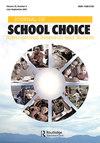Evaluating School Priorities for Equal Opportunity in Admission to Schools
Q2 Social Sciences
引用次数: 0
Abstract
ABSTRACT Schools’ priorities in student selection constitute the basis for fairness in school admissions. We study the case where schools are active strategic players that rank their applicants in terms of priorities. A methodological framework is developed to examine the impact of the variation in the admission settings on the equality of opportunity in access to high-quality schools. The school’s priorities are formulated following a Multi-Attribute Decision Analysis (MADA) approach with several scenarios including geographic, family, academic, and socioeconomic variables. The matching is simulated using student preferences, multiple assignment algorithms, varying school capacities, and changing priority profiles. The Human Opportunity Index (HOI) logistic regression approach is used to examine how far from, or how close the admission is to being an equitable assignment, i.e., one that gives equal opportunities to children with different backgrounds. The analysis is based on choice admission data from a large specialized (magnet) middle school program in Florida. The results suggest that how the school priority is designed slightly affects the equality of opportunity. The second impact is due to the algorithm used to perform the selection. The availability of places in high-quality schools has a big impact and is tightly correlated with the parents’ satisfaction with their most preferred school choices.评估学校优先录取的平等机会
学校选择学生的优先顺序构成了学校录取公平的基础。我们研究的案例中,学校是积极的战略参与者,根据优先级对申请人进行排名。制定了一个方法框架,以检查录取设置的变化对进入高质量学校的机会平等的影响。学校的优先事项是根据多属性决策分析(MADA)方法制定的,其中包括地理、家庭、学术和社会经济变量。匹配是模拟使用学生的偏好,多重分配算法,不同的学校能力,并改变优先级配置文件。人类机会指数(HOI)逻辑回归方法用于检查入学距离公平分配的距离有多远,或有多接近公平分配,即为不同背景的儿童提供平等机会。该分析是基于佛罗里达州一个大型专门中学项目的选择录取数据。结果表明,学校优先级的设计方式对机会均等有轻微影响。第二个影响是由于用于执行选择的算法。高质量学校的可获得性有很大的影响,并且与家长对他们最喜欢的学校选择的满意度密切相关。
本文章由计算机程序翻译,如有差异,请以英文原文为准。
求助全文
约1分钟内获得全文
求助全文

 求助内容:
求助内容: 应助结果提醒方式:
应助结果提醒方式:


